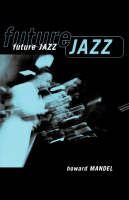
Future Jazz
Seiten
2000
|
New edition
Oxford University Press Inc (Verlag)
978-0-19-514121-4 (ISBN)
Oxford University Press Inc (Verlag)
978-0-19-514121-4 (ISBN)
- Titel ist leider vergriffen;
keine Neuauflage - Artikel merken
The book surveys jazz of the past several decades, with emphasis upon jazz that is not just 'mainstream'. The focus is particularly on the experimenters - those attempting to extend jazz's range. The book does, however, cover the whole range of jazz since 1970, and deals as well with the clubs and record companies that feature it.
The book calls attentions to the different directions that jazz has developed in recent decades. No longer a popular art - as in earlier decades in this century - jazz has split into many groups and factions. Now Howard Mandel makes sense of this active jazz scene - interest in jhazz has considerably increased in the 1990s - and discusses the major figures and trends. Jazz's greatest success since 1980 has come from the so-called "Young Lions" - people who have drawn upon older jazz tradtions and helped codify them. The leader of this group is Wynton Marsalis, a brilliant trumpeter who runs the jazz program at Lincoln Center in New York. In his survey of recent jazz, Mandel does describe the influence and accomplishments of these "Young Lions", but he devotes most of his attention to the more experimental and avant garde trends that have had a large role in developing jazz since 1970. He also describes the New York scene through its jazz clubs - mostly below 14th Street, in the East and West Villages, and below - who feature this new jazz.
The book traces the originality and development of some fo the dominant new jazz groups in the period - such as the Art Ensemble of Chicago and the World Saxophone Quartet - as well as a whole range of experimental groups. In a departure from almost all other jazz books, Mandel describes the great influence that rock, in its various forms, has had upon this jazz - especially the way that it has proved to be the training ground for and crucial influence on many of these musicians. It discuesses such major contemporary jazz figures as David Murray, Henry Threadgill, Joe Lovano, Geri Allen, and singer Cassandra Wilson, as well as some current experimental groups on the fringes of New York jazz life. Future Jazz fills a gap in jazz literature. It speaks to the jazz of today and offers the reader clear guidelines and valuable insights into this music and its future. It will serve as a primer for jazz listeners today.
The book calls attentions to the different directions that jazz has developed in recent decades. No longer a popular art - as in earlier decades in this century - jazz has split into many groups and factions. Now Howard Mandel makes sense of this active jazz scene - interest in jhazz has considerably increased in the 1990s - and discusses the major figures and trends. Jazz's greatest success since 1980 has come from the so-called "Young Lions" - people who have drawn upon older jazz tradtions and helped codify them. The leader of this group is Wynton Marsalis, a brilliant trumpeter who runs the jazz program at Lincoln Center in New York. In his survey of recent jazz, Mandel does describe the influence and accomplishments of these "Young Lions", but he devotes most of his attention to the more experimental and avant garde trends that have had a large role in developing jazz since 1970. He also describes the New York scene through its jazz clubs - mostly below 14th Street, in the East and West Villages, and below - who feature this new jazz.
The book traces the originality and development of some fo the dominant new jazz groups in the period - such as the Art Ensemble of Chicago and the World Saxophone Quartet - as well as a whole range of experimental groups. In a departure from almost all other jazz books, Mandel describes the great influence that rock, in its various forms, has had upon this jazz - especially the way that it has proved to be the training ground for and crucial influence on many of these musicians. It discuesses such major contemporary jazz figures as David Murray, Henry Threadgill, Joe Lovano, Geri Allen, and singer Cassandra Wilson, as well as some current experimental groups on the fringes of New York jazz life. Future Jazz fills a gap in jazz literature. It speaks to the jazz of today and offers the reader clear guidelines and valuable insights into this music and its future. It will serve as a primer for jazz listeners today.
Howard Mandel has written about jazz for twenty-five years, publishing in Billboard, The Village Voice, Jazziz, The New York Times Book Review, and Down Beat. He is a former editor of Down Beat, Ear Magazine, and RhythmMusic. His commentaries are heard on National Public Radio's Morning Edition. He is president of the Jazz Journalists Association, edits its web site (www.jazzhouse.org), and teaches "The Arts: Jazz" at NYU. He lives in New York City.
| Erscheint lt. Verlag | 26.7.2001 |
|---|---|
| Verlagsort | New York |
| Sprache | englisch |
| Maße | 130 x 200 mm |
| Gewicht | 229 g |
| Themenwelt | Kunst / Musik / Theater ► Musik ► Jazz / Blues |
| Kunst / Musik / Theater ► Musik ► Klassik / Oper / Musical | |
| ISBN-10 | 0-19-514121-0 / 0195141210 |
| ISBN-13 | 978-0-19-514121-4 / 9780195141214 |
| Zustand | Neuware |
| Haben Sie eine Frage zum Produkt? |
Mehr entdecken
aus dem Bereich
aus dem Bereich
zur politischen Ästhetik des Jazz
Buch | Hardcover (2023)
Phillip Reclam (Verlag)
38,00 €
Die Geschichte des Jazz in Deutschland
Buch | Softcover (2021)
Reclam, Philipp (Verlag)
20,00 €


